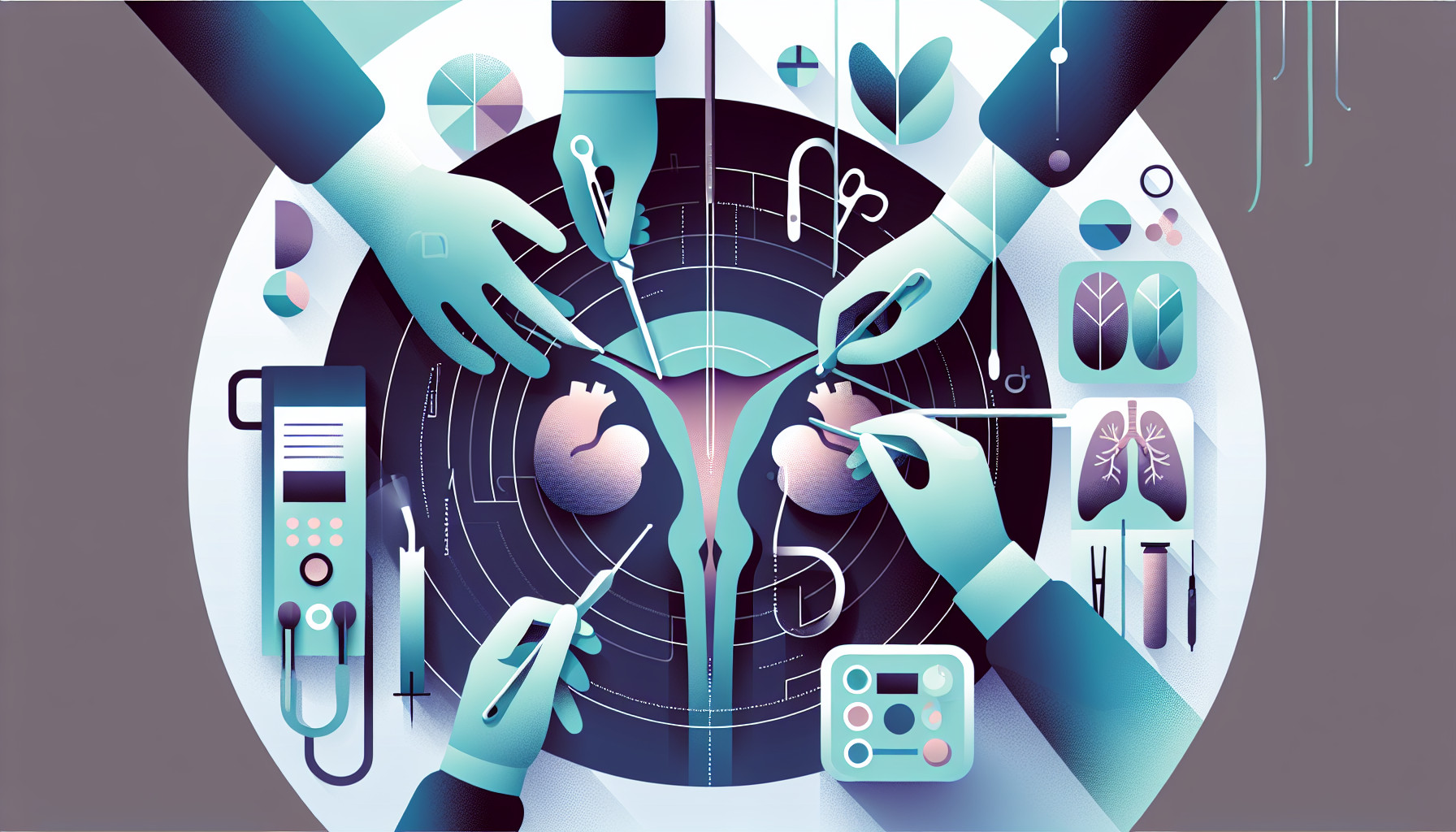Our Summary
The research paper discusses a unique case where a woman who had previously undergone a kidney transplant and was receiving supportive treatment, peritoneal dialysis (PD), due to kidney transplant failure, had to undergo a hysterectomy (removal of the uterus) due to endometrial cancer. The operation was performed using a laparoscopic technique (small incisions and the use of a camera). This appears to be the first case of its kind reported.
The operation was successful without any unusual problems during surgery, but they noticed leakage from the peritoneum (the membrane that lines the abdomen) after the operation. The paper looks at other cases where women have had a hysterectomy for endometrial cancer after a kidney transplant and while receiving PD.
The conclusion is that a laparoscopic hysterectomy can be safely performed on a patient who has had a kidney transplant and is receiving PD, as long as care is taken to avoid damaging the transplanted ureter and kidney artery, and to prevent leakage from the peritoneum. The latter can be achieved by carefully stitching the peritoneum and avoiding contact with the PD catheter (a tube used for the dialysis treatment).
FAQs
- What is the significance of the reported case of a total conventional laparoscopic hysterectomy on a patient undergoing peritoneal dialysis due to renal transplantation failure?
- How can potential complications, such as injury to the transplanted ureter and renal artery or peritoneal leakage, be avoided during a laparoscopic hysterectomy on a patient undergoing peritoneal dialysis?
- Can a laparoscopic hysterectomy be considered safe for patients who have undergone renal transplantation and are currently on peritoneal dialysis?
Doctor’s Tip
A helpful tip a doctor might tell a patient about laparoscopic hysterectomy is to make sure to follow post-operative care instructions carefully to help minimize the risk of complications such as peritoneal leakage. It is important to avoid heavy lifting and strenuous activity for a certain period of time after the surgery, as well as to keep the incision sites clean and dry. Additionally, attending follow-up appointments with the doctor is crucial for monitoring the healing process and addressing any concerns that may arise.
Suitable For
Patients who are typically recommended for laparoscopic hysterectomy are those who have undergone renal transplantation and are receiving peritoneal dialysis as a supportive therapy for chronic renal failure. In these cases, it is important to avoid injury to the transplanted ureter and renal artery during the surgery. Additionally, careful attention should be paid to avoiding post-surgical peritoneal leakage by suturing the peritoneum carefully and avoiding contact with the peritoneal dialysis catheter. This case report highlights the safety and feasibility of laparoscopic hysterectomy in this specific patient population.
Timeline
- Patient undergoes renal transplantation and begins peritoneal dialysis therapy for chronic renal failure
- Patient is diagnosed with endometrial cancer and recommended for hysterectomy
- Patient undergoes total conventional laparoscopic gynecologic hysterectomy
- No unusual intraoperative complications are experienced
- Post-surgical peritoneal leakage is observed
- Literature review of alternative surgical methods for hysterectomy in renal transplantation patients undergoing peritoneal dialysis
- Laparoscopic hysterectomy is determined to be safe if precautions are taken to avoid injury to transplanted organs and careful peritoneum suturing to prevent leakage.
What to Ask Your Doctor
How will the laparoscopic hysterectomy procedure be performed in my case considering my history of renal transplantation and current peritoneal dialysis therapy?
What are the potential risks and complications of undergoing laparoscopic hysterectomy in my specific situation?
How will my renal function be monitored during and after the procedure?
Will my immunosuppressant medication regimen need to be adjusted before or after the surgery?
How long is the recovery period expected to be, and what limitations or restrictions should I be aware of post-operatively?
Will the laparoscopic hysterectomy affect my ability to continue peritoneal dialysis, and if so, how will this be managed?
Are there any alternative surgical options or considerations that should be taken into account given my medical history?
What follow-up care and monitoring will be necessary after the laparoscopic hysterectomy, particularly in relation to my renal function and peritoneal dialysis?
Reference
Authors: Kakuda M, Kobayashi E, Tanaka Y, Ueda Y, Yoshino K, Kimura T. Journal: J Obstet Gynaecol Res. 2017 Jul;43(7):1232-1237. doi: 10.1111/jog.13337. Epub 2017 Jun 14. PMID: 28613035
